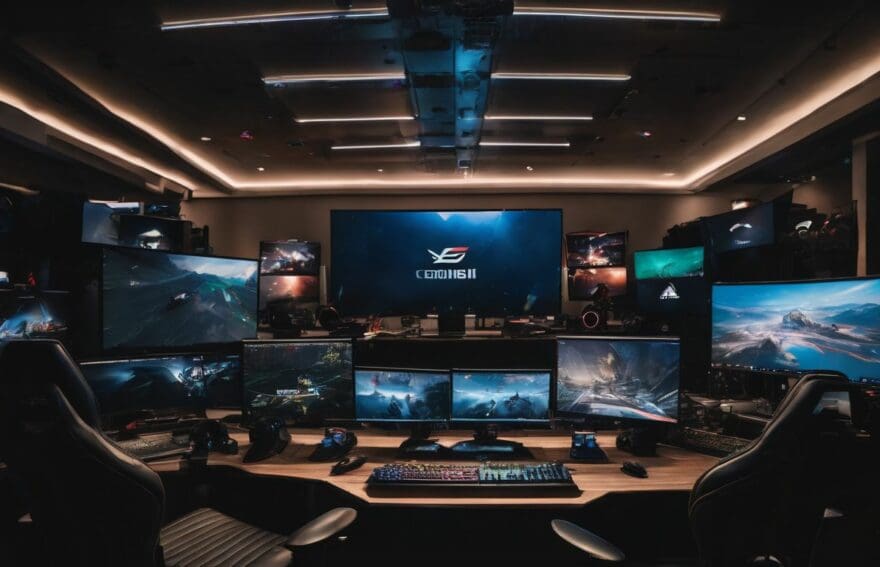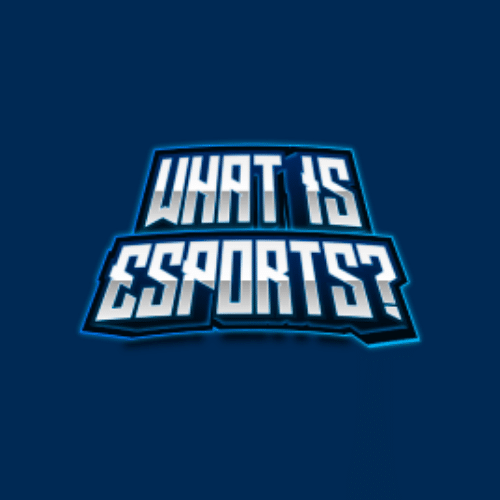Inside Esports Teams: Structure, Strategy, and Success

Updated On: November 28, 2025 by 
Have you ever felt that itch of curiosity about the magic that happens behind the scenes at leading esports teams? We’ve all been there, quietly pondering how these squads pull off such consistently impressive feats.
After delving deep with meticulous research, we’re absolutely chuffed to bring to light our findings. Exploring everything from the nuanced team dynamics to cutting-edge tactics that lead them to glory, this article will navigate you through what it takes to craft a flourishing esports enterprise.
So come along, let’s peel back the curtain and discover together what makes these organisations tick and triumph!
Understanding the Structure of Esports Teams
The structure of esports teams is crucial for their success, with defined hierarchies and specific roles within the team. Player contracts and negotiations play a key role, as well as the support and resources provided by the organisation.
Understanding these dynamics is essential for anyone interested in the world of competitive gaming.
Team hierarchy and roles
Every esports team has a clear hierarchy and different roles to ensure smooth operations, just like any successful business. We’ve got our star players, who are the public faces of the team and usually specialise in certain aspects of gameplay.
They’re supported by coaches, analysts, and strategists who dissect gameplay data to refine tactics and give our teams an edge during competitions.
Behind the scenes are managers and support staff handling logistics, contracts, marketing in esports, audience engagement strategies – all vital for maintaining a competitive edge both on-screen and off.
Our content creators play their part as well; they keep fans hooked with engaging posts that build loyalty among followers. These diverse roles come together to create a powerhouse that drives success in competitive gaming arenas around the world.
Player contracts and negotiations
As we delve into the inner workings of esports teams, it’s crucial to understand the dynamics of player contracts and negotiations. Esports teams operate similarly to traditional sports clubs, with players being signed onto yearly contracts as employees.
Negotiations play a pivotal role in securing talented gamers, as both parties strive for mutually beneficial agreements that encompass salaries, bonuses, and additional incentives based on performance metrics.
Esports organisations aim to retain their top talents through effective contract negotiations while also adhering to industry standards in terms of compensation and benefits. The competitive nature of these negotiations reflects the rapid growth and expansion of the esports industry, where securing skilled players is essential for long-term success.
Organisational support and resources
After negotiating player contracts, the next crucial step is to ensure organisational support and resources for the success of an esports team. Esports organisations often provide players with access to top-tier gaming equipment, training facilities, and coaching staff.
Additionally, they allocate financial resources for travel expenses, accommodations during tournaments, and mental health support services to maintain players’ well-being. These measures demonstrate the industry’s commitment to nurturing talent and ensuring a conducive environment for professional gaming.
Esports teams also benefit from endorsements and sponsorships that provide further financial backing and marketing exposure. This invaluable support enables teams to participate in high-stakes tournaments and invest in performance training programs.
The Importance of Strategy in Esports
Understanding the intricacies of strategy in esports is crucial for success. From analysing opponents and adapting gameplay to developing team chemistry and communication, a strong strategic approach can make all the difference in competitive gaming.
Analysing opponents and adapting gameplay
Esports teams analyse opponents to develop winning strategies. Utilising data and statistics, we identify opponent patterns and tendencies. This informs our gameplay adjustments for a competitive edge.
Understanding the importance of adapting gameplay allows us to counter opponents effectively in real-time. By studying their play style, we can anticipate moves and devise effective tactics during matches.
Adapting gameplay is crucial for success in esports tournaments. We constantly refine strategies based on opponent analysis, improving our chances of victory. Team chemistry and communication play vital roles in swiftly executing adaptations during high-pressure situations.
Developing team chemistry and communication
Continuously working on analysing opponents and adapting gameplay helps teams build a bond that forms the foundation of strong chemistry and communication. This synergy is vital for effective in-game coordination, establishing team strategies, and fostering an environment of trust among players.
Utilising data, statistics, and real-time feedback from matches enhances decision-making processes, enabling seamless communication during intense competitive gaming scenarios.
Team chemistry further flourishes through open lines of communication during regular meetings and constructive discussions. Clear and concise information exchange fosters unity within the team, promoting quick adaptations to evolving game dynamics.
Utilising data and statistics
Esports teams leverage data and statistics to gain valuable insights into their opponents’ gameplay patterns, strategies, and weaknesses. By analysing match data, teams can identify trends, predict opponent behaviour, and adjust their own strategies accordingly.
Understanding the importance of specific in-game statistics allows teams to make informed decisions for improved performance.
Teams also utilise player-specific stats to assess individual strengths and weaknesses within their roster. This data-driven approach helps in player development by identifying areas for improvement and tailoring training programs to enhance overall team performance.
Preparing for Success in Esports
We’ll discuss the importance of training and practice routines, focusing on mental and physical health, as well as maintaining a work-life balance to excel in esports. Keep reading to learn more about how these factors contribute to success in competitive gaming.
Training and practice routines
Esports teams dedicate significant time to training and practice, which are crucial for maintaining a competitive edge in the gaming world. This involves:
- Conducting regular scrimmages against other professional teams to fine-tune strategies and teamwork.
- Reviewing gameplay footage to identify areas of improvement and refine individual and team tactics.
- Engaging in physical conditioning exercises to enhance endurance and focus during long gaming sessions.
- Participating in skill – building workshops and seminars conducted by industry experts to continuously improve gameplay techniques.
Mental and physical health
Transitioning from training and practice routines, maintaining mental and physical health is crucial for peak performance in esports. Here are some essential practices:
- Implement a balanced diet rich in nutrients to fuel the body and mind during competitive play.
- Regular physical exercise to enhance stamina, focus, and overall well – being.
- Adequate rest and sleep to rejuvenate the body for optimal cognitive function.
- Mindfulness techniques such as meditation or deep breathing exercises to manage stress and anxiety effectively.
- Seeking professional help when necessary, like consulting with therapists or sports psychologists.
Maintaining a work-life balance
Balancing professional gaming with personal well-being is crucial for esports players. We must prioritise mental and physical health to ensure peak performance in the competitive gaming environment.
Addressing this, our teams incorporate rest days and encourage hobbies or activities outside of gaming to alleviate stress. Additionally, establishing a structured daily routine aids in separating work from personal life, enabling players to maintain a healthy balance.
We acknowledge the significance of maintaining a stable work-life equilibrium. Our teams emphasise the importance of self-care by promoting regular exercise, mindfulness practices, and proper nutrition as essential components of managing our overall well-being alongside professional commitments.
Communication and Teamwork in Esports
Effective communication and teamwork are essential for success in esports. From the role of a team captain to handling conflicts and differences, strong communication is key to achieving victory in competitive gaming.
Let’s dive into the importance of effective teamwork and communication within esports teams.
The role of a team captain
A team captain plays a pivotal role in leading and managing the esports team. They are responsible for fostering teamwork, coordinating strategies, and ensuring effective communication among players.
A team captain also serves as a liaison between the players and the organisation, representing the team’s interests in negotiations and decision-making processes. Additionally, they provide mentoring and support to teammates, helping them navigate challenges and maintain a positive mindset for peak performance during competitions.
Leading by example, the captain sets high standards for commitment to training routines and maintaining physical and mental well-being, ultimately contributing to the overall success of the esports team.
Captains are key figures in creating a cohesive unit within an esports team through their leadership skills. They facilitate constructive dialogue during meetings or debriefings while handling conflicts or differences with diplomacy.
Team meetings and debriefings
In esports, team meetings and debriefings are crucial for effective communication and strategy development. During these sessions, teams discuss game tactics, review past performances, and plan for future matches.
- Analysing gameplay footage to identify strengths and weaknesses.
- Discussing individual player roles and responsibilities within the team.
- Sharing feedback on communication during matches to improve coordination.
- Reviewing opponents’ strategies to adapt and counter effectively.
- Brainstorming new tactics and refining existing game plans.
- Setting short-term and long-term performance goals for the team.
Dealing with conflicts and differences
Conflict resolution is a vital skill for esports teams to maintain team chemistry and performance. Addressing conflicts directly and openly can prevent them from escalating and affecting the overall teamwork.
Constructive communication, active listening, and finding common ground are essential in resolving differences within the team.
Diversity of opinions and playing styles can lead to conflicts, but embracing these differences can also bring about innovative strategies and gameplay approaches. Understanding how to navigate through conflicting ideas while still respecting individual contributions is crucial for fostering a harmonious team environment.
Strong Mental Game: The Key to Success in Esports
Coping with pressure and stress is crucial in the world of esports. Mental strategies for improved performance and building resilience are essential for overcoming failure and achieving success in competitive gaming.
Coping with pressure and stress
To cope with pressure and stress in esports, we can develop mental strategies for improved performance. Focusing on mindfulness and visualisation techniques can help maintain a positive mindset during intense gameplay.
Moreover, building resilience is crucial, as it allows players to bounce back from setbacks and failures. Engaging in regular physical exercise and maintaining a balanced lifestyle will contribute to overall well-being, aiding in stress management.
Implementing mental strategies such as deep breathing exercises before matches enhances focus and reduces anxiety levels. In addition, acknowledging the impact of stress on performance and discussing coping mechanisms within teams fosters a supportive environment.
Mental strategies for improved performance
Successful esports players understand the significance of mental strategies for achieving top performance. Coping with pressure and stress is essential, as it directly impacts gameplay.
Utilising effective mental techniques can improve resilience, enabling players to overcome failure and maintain a clear focus during intense competition.
Implementing mental strategies enhances overall performance by providing a competitive edge. Embracing these techniques not only strengthens the mind but also equips players with the ability to thrive under challenging circumstances, thereby contributing to sustained success in the dynamic world of esports.
Developing strong mental fortitude is key to excelling in high-stakes tournaments and maintaining consistency in gameplay.
Building resilience and overcoming failure
Building resilience in esports is crucial for overcoming the inevitable setbacks and failures that come with competitive gaming. Esports athletes often face intense pressure and stress, making it essential to develop mental strategies to cope with such challenges.
By implementing techniques such as mindfulness, visualisation, and positive self-talk, players can strengthen their mental game and bounce back from defeats more effectively.
Overcoming failure in esports also involves learning from mistakes and using them as opportunities for growth. Analysing gameplay data, reviewing past performances, and seeking feedback from coaches and teammates are all valuable tools for identifying areas of improvement.
Conclusion
In conclusion, understanding the structure and strategy of esports teams is crucial for their success in competitive gaming. Teams need to prioritise effective communication, teamwork, and mental resilience to excel in this fast-growing industry.
With strong leadership, strategic planning, and a focus on well-being, esports teams can position themselves for long-term success and growth within the dynamic world of professional gaming.
FAQs
1. What is the structure of an esports team?
Esports teams are organised with players, coaches, and managers to ensure efficient team management and communication for competitive success.
2. How important is strategy in esports?
Strategy is key inside esports teams because it guides how the team plays together, making decisions that can lead to victories in high-stakes competitions.
3. Do esports teams get sponsorships for funding?
Yes, sponsorship deals are a major part of esports investment, helping fund the teams whilst also promoting growth within the esports market trends.
4. How do Esports organisations communicate effectively?
Good team communication tools and practices are essential in managing strategies and ensuring all members stay informed about their roles and objectives.
5. Why has there been such growth in the Esports industry?
The explosive growth of the industry comes from global interest in competitive gaming, increasing Esports investments, marketing efforts, and significant events attracting viewership.


